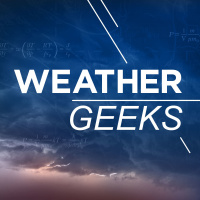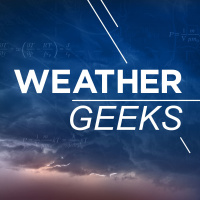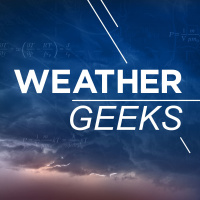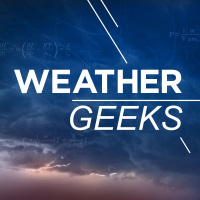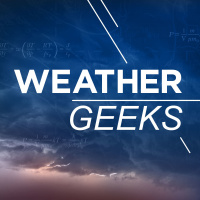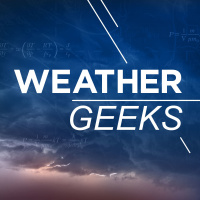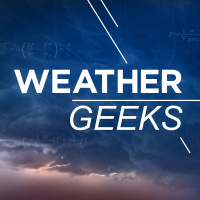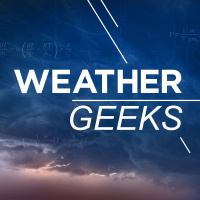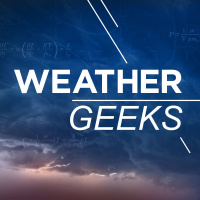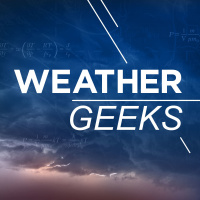Synopsis
You see it every day. Its the subject of poetry, literature, art and film. It can inspire spiritual experiences, and it can destroy everything you have ever worked for. It is the weather, and no one knows it better than we do. Join us every week for the agony and the ecstasy of the one story that the entire world participates in and the science behind it. From the people behind The Weather Channel TV network.
Episodes
-
Are Floating Cities the Future of Hurricane Protection?
10/06/2020 Duration: 32minGuest: Marc Collins Chen, OceanixIntroduction: When a hurricane is fast approaching, experts always say that you have to fear the water, whether it’s rain coming down from the sky or the surge from the ocean or the flood from the rivers. What if I told you that my guest today has created a concept that would make you flock to the water and live a safer life from hurricanes? Marc Collins Chen is the CEO of Oceanix, a company that builds floating structures that can hold up to thousands of residents. Could Oceanix’s plan be the future of hurricane and climate change protection?
-
Professor, Author, and Atmospheric Model Extraordinaire
03/06/2020 Duration: 38minGuest: Dr. Adam Sobel, Columbia UniversityIntroduction: Most of the time when we bring someone on to Weather Geeks, they have a certain niche or a specific craft or an interesting line of research to discuss with us. But today, I have a guest with me who does it all! Dr. Adam Sobel is a professor of Applied Physics and Applied Mathematics and of Earth and Environmental Sciences at Columbia University. He teaches everything from tropical meteorology to climate thermodynamics to differential equations, so he’s certainly going to teach us Geeks a thing or two... about a thing or two!
-
COVID-19’s Impact on Pollution
27/05/2020 Duration: 37minGuest: Ryan Stauffer, NASAIntroduction: The COVID-19 pandemic has changed how we all live our lives, both in the present and in the future. We’ve all been stuck in our homes and adopted teleworking techniques in order to reduce as much time as possible with other people that may be sick. With these changes, we have noticed some positive impacts to our environment, including animals flocking to places they normally don’t and improved air quality in major cities. Today we’ve brought in Dr. Ryan Stauffer from NASA to discuss how this quarantine has impacted our current pollution output and how it is modeled out in the future.
-
Keeping Up the PACE with NASA
20/05/2020 Duration: 34minGuest: Ivona Cetinic, NASA OceanographerIntroduction: NASA does a lot more than mapping our solar system...they have also been mapping our oceans for over 20 years! The ocean is extremely important in our Earth’s health, circulation, and economy, so it is equally as important that our ocean is in good health too! In 2022, NASA will be launching the PACE mission, which stands for Plankton, Aerosol, Cloud, ocean Ecosystem, to further advance their understanding of our oceanic and atmospheric health. Today’s guest is Ivona Cetinic, who is the project science lead for Ocean Biogeochemistry on this mission and has devoted her entire career to better understanding our world’s oceans.
-
Communicating Climate
13/05/2020 Duration: 38minGuest: Bernadette Woods - PlackyIntroduction:The proper communication of climate science is just as important as communicating it at all! In an ever-changing world, keeping up with communication techniques is extremely important. The intersection of television and science has never been more vital than today! On this episode, we’re joined by Bernadette Woods Placky, Chief Meteorologist and Climate Matters program director, a division of Climate Central. As an Emmy Award winning on-camera-meteorologist Placky, can help us fully understand the line between proper and poor climate communication techniques!
-
Mitigating Disasters & Their Impacts on Society
06/05/2020 Duration: 38minGuest: Dr. Stephen Strader, Villanova UniversityIntroduction:Hurricane Harvey...Hurricane Dorian...the deadly Camp Fire...the devastating Super Tornado Outbreak of 2011… These disasters likely bring to mind the powerful images you saw from communities hardest hit by these extreme weather events. In a world with an increasing number of disasters, it’s becoming more apparent that we need to work to understand our own vulnerabilities so we can prevent future disasters. Today’s guest is Dr. Stephen Strader, Assistant Professor of Geography and the Environment at Villanova University. In addition to his knowledge of the atmosphere, his work also focuses on the hazards and risks associated with extreme weather. We’ll discuss the various tools he uses to determine areas at risk, as well as ways we can understand and prepare our society to reduce future effects of disasters.
-
Radar Meteorology & Observations of Severe Storms
29/04/2020 Duration: 41minGuest: Stephen Nesbitt, University of IllinoisIntroduction:Today we’re happy to welcome Professor Stephen Nesbitt from the University of Illinois. Dr. Nesbitt has his hands in a variety of projects & research interests, including mesoscale and cloud dynamics, radar and satellite meteorology, and tropical meteorology. His extensive field research has taken him to 5 continents for more than 20 field campaigns! One such project required his team to travel to Argentina & Brazil to study some of Mother Nature’s fiercest thunderstorms. We’ll also learn more about the great Atmospheric Science program at Illinois and learn about new and exciting projects he has planned in the future.
-
The Science of Climate Drawdown
22/04/2020 Duration: 37minGuest: Dr. Marilyn Brown, Georgia Tech Introduction: The word “drawdown” is used in multiple fields, from banking to investing, but for today’s episode, the most important use of the word is in climatology. Climate drawdown is the point at which greenhouse gas concentrations begin to decline on a year-to-year basis in order to reach carbon neutrality. The United States still has to take many steps in order to achieve drawdown, but there are many teams of brilliant scientists across the country that are putting solutions on the table to make this goal attainable. One of those brilliant scientists is my guest today, Dr. Marilyn Brown from Georgia Tech.
-
Severe Storms & Tornadoes - Ties to Climate Change
15/04/2020 Duration: 44minGuest: Dr. Harold Brooks, NSSLIntroduction: The United States is known to produce some of nature’s most severe weather as it allows for just the right ingredients to come together. As extreme weather becomes a more common occurrence, many have begged the question: Will we see more severe storms and even tornadoes as our world continues to warm? Today’s guest is Dr. Harold Brooks of the National Severe Storms Research Lab, and his research seeks to help answer this very question. His extensive background in severe weather has offered him the opportunity to study these changing trends in tornadoes and severe storms in recent decades. While storms may be getting worse, the exact answers of what we can expect in the future are more complicated than you think. Let’s dive in!
-
With Severe Weather, Anything GOES
08/04/2020 Duration: 38minGuest: Dan Lindsey, GOES-R Program Scientist Introduction: While the debate of “model wars” continues into the new decade, the satellite technology that the United States has advanced over the years is second-to-none! Being able to see the atmosphere from a top-down view has changed the way that meteorologists around the world can forecast the daily weather. They can see where severe storms are to provide up-to-the-second forecasts in order to keep people safe. One of the men behind these great satellites is here with me today. Dan Lindsey is a research scientist at NOAA and he was at the forefront of one of the latest major satellite launches, the GOES-16 geostationary satellite.
-
Flooding from a Hydrologist’s Perspective
01/04/2020 Duration: 36minGuest: Michael Kane, Water Resources EngineerIntroduction: Hydrology is the study of the movement, distribution and management of water on Earth, including the water cycle, water resources, and environmental watershed sustainability. Hydrologists work with other scientists to investigate how water impacts their respective fields, so meteorologists and hydrologists have a special relationship. Meteorologists focus on the water coming down from the sky, and the hydrologists focus on what that water will impact when it hits the ground and where it will end up. What happens when there is too much water and flooding ensues? Hydrologist Michael Kane is my guest today and we are going to talk about that...
-
Waiting to “Exascale”: Prepping the EURO Model for the Next Generation in Computing Power
25/03/2020 Duration: 36minGuest: Dr. Peter Bauer, ECMWF Deputy Director of Research & Head of the Scalability ProgrammeIntroduction: I need more power…!! Computing power that is. This has been a major focus for numerical weather prediction in hopes of creating more accurate and detailed predictions of Earth’s systems. The highly touted European Model has long been one of the leaders in numerical weather prediction performance. As the European Centre for Medium-Range Weather Forecasts (ECMWF) prepares to integrate the next generation of supercomputers, model efficiency may suffer as more data is computed at higher resolutions. Current processing capabilities and codes are not adapted to meet these needs. Today’s guest, Dr. Peter Bauer, will outline how they are working with meteorological modellers, computer scientists and hardware providers to make sure the EURO is ready for this upgrade.
-
“Northern Tornadoes Project” - Tornadoes North of the Border
18/03/2020 Duration: 38minGuests: Greg Kopp & David Sills, Western University Intro: While severe weather prediction continues to improve here in the United States, a nearby neighbor is currently deep into their most comprehensive tornado study ever! As we travel north of the border to our neighbors in Canada, the team at Western University is conducting the Northern Tornadoes Project, or NTP. This project seeks to have profound impacts on tornado and severe weather prediction across the forecasting community, both nationally and internationally. Today on Weather Geeks, we’re joined by the two project leads at Western University; Greg Kopp who is the lead researcher, and David Stills, the executive director on the project.
-
When Weather Gets Personal: Lessons Learned from Disaster
11/03/2020 Duration: 36minGuest: Kim Klockow-McClainBroadcast meteorologists are often the face of severe weather as they are the first people we see when severe weather is expected. However, there is a larger network of people from broadcasters, to emergency managers, law enforcement officers, and state and local officials who must work together to best serve the community before and after a disaster. Today’s guest is Kim Klockow-McClain, a societal impacts researcher from the Cooperative Institute for Mesoscale Meteorological Studies (CIMMS). Her focus is to gather and share the human stories that unfold during severe weather events, and with each interaction, she strives to learn how our network of communicators can improve the warning-decision process.
-
June Bacon-Bercey: Breaking Barriers in Meteorology
04/03/2020 Duration: 34minGuest: Dail St. Claire: Daughter of the June Bacon-Bercey, the 1st African-American Female TV MeteorologistIntroduction: If I were to ask a room full of meteorologists who their role model was, I am sure that a handful of them would say the late June Bacon-Bercey. She was the first African-American female television meteorologist, and with that achievement, she broke MANY barriers. In a time where most of the women giving the weather reports in the morning weren’t trained in meteorology in the slightest, June was determined to follow her passion and that is why she is recognized to this very day. Today I have her wonderful daughter Dail St. Claire with me today so we can celebrate her mother’s legacy...
-
Can You Measure How Severe Your Winter Has Been?
26/02/2020 Duration: 37minIntroduction: A lot of people choose to live in a certain place based on how the winters are. If you love wearing big comfy sweaters and playing out in the snow, odds are you live in the midwestern or northeastern United States. If you would rather turn on your heat for only a couple days in the season and enjoy the occasional chilly, rainy day, then you’d love the south! Regardless of the region, scientists have developed a method that can measure how severe the winter has been where you live. It is called the Accumulated Winter Season Severity Index, and I have the co-creator Dr. Barb Mayes Boustead here with me today to discuss it!
-
Weathering the Storm: Climate Change & Mental Health
19/02/2020 Duration: 39minIntroduction: As Weather Geeks, we know that the climate is changing and the Earth has needs that it wants to meet. As human beings, we are also changing and our bodies and minds have needs that they want met as well. Both of these sets of needs cannot be ignored or else there will be ramifications down the line. Scientists who are tasked with tackling and researching climate change are starting to experience mental and emotional health issues, because of all the pressures that this monumental event brings. My guest today is Susanne Moser, who is shedding light on these issues, along with the personal challenges that being an on-camera meteorologist in this current age brings.
-
The Inner Workings of an NWS Office
12/02/2020 Duration: 40minGuest: Keith Stellman, Meteorologist-in-Charge NWS AtlantaIntro:The National Weather Service is a lot more than the blaring alerts on your TV when there is a tornado warning in your area or the notifications on your phone about the severe thunderstorm watch issued for your state. The NWS operates over 120 weather forecast offices across the country and each office is constantly issuing local public, marine, aviation, fire, and hydrology forecasts 24/7! The NWS never sleeps because the weather itself never sleeps, and I’m sure my next guest can attest to many sleepless nights on the job. Keith Stellman is the Meteorologist-in-Charge for NWS Atlanta/Peachtree City, and as I know personally, this area rarely has a dull weather day!
-
Strange Clouds - Pyrocumulonimbus
05/02/2020 Duration: 34minGuest: Dr. David Peterson, NASA/Naval Research LabAs millions of acres have been ablaze across Australia in recent weeks, those wildfires have formed incredible smoke plumes that tower thousands of feet into the atmosphere. These “pyrocumulonimbus clouds” can transport massive amounts of smoke and ash into the sky, and some of that smoke has even been found to have circled the globe! Today’s guest is Dr. David Peterson from the Naval Research Lab, and his research focuses on the far-reaching impacts these monster clouds can have, including how they generate their own weather! We’ll discuss what techniques he uses to observe these events and whether or not we can expect more events in a warming climate.
-
The Father of Environmental Justice
29/01/2020 Duration: 35minIntro: With the increasing number of climate change impacts being seen across the globe, it is becoming apparent that not all communities are affected equally. Today’s guest has dedicated his career to being a champion for at-risk populations facing environmental challenges, and has even been lauded as the Father of Environmental Justice. Dr. Robert Bullard is an award-winning author and also serves as a Distinguished Professor of Urban Planning and Environmental Policy at Texas Southern University. We’ll discuss how his work aims to bring attention to such humanitarian crises and how we can work together to secure the environmental health and resilience of all communities being affected by extreme weather.

